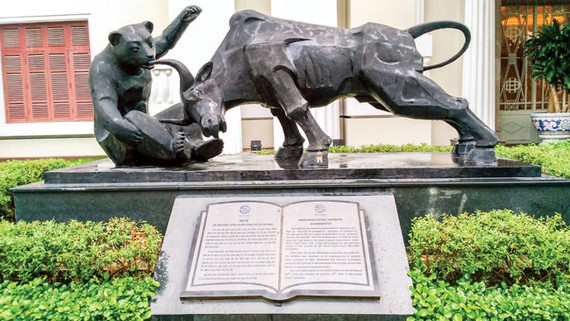 Economy
Economy


|
| The symbol of bull and bear in front of the Hồ Chí Minh Stock Exchange (HoSE). — Photo saigondautu.com.vn |
HÀ NỘI — In a recent report, the Bank for Investment and Development of Việt Nam Securities Company (BSC) said that the COVID-19 impacts will be shown in the third quarter business results, leading to a strong division among stock groups.
The securities firm said that the Delta variant of coronavirus is spreading in Asia, while the European Union’s and the US’ economies are witnessing a clear recovery.
This boosts the US Federal Reverse (Fed) to consider tapering its ultra-loose policy later this year, while China maintains its loose monetary policy to stimulate the economy.
In Việt Nam, measures to strengthen disease prevention continue to affect production and business activities, as well as the labour situation. However, the number of businesses closing for long periods and dissolutions have declined, showing that businesses have gradually adapted to the pandemic.
BSC revised down its GDP outlook to 5.29 per cent, and even to 4.06 per cent in the negative scenario if the ongoing COVID-19 outbreak lasts longer than expected.
Because of the pandemic, companies within supply chains continued to not operate at full capacity, causing the PMI to reach a low of 40.2 points in August.
However, as the outbreak is somewhat under control and the social distancing measures are gradually lifted, the recovery outlook is brighter in the near future.
BSC also added that budget disbursement continues to play an important role in maintaining the outlook for 2021. In the first eight months of this year, the Government has disbursed around VNĐ513 trillion (US$22.45 billion).
In August, Việt Nam recorded a trade deficit of $1.3 billion. BSC believes that the situation will continue as the group of machinery, equipment and spare parts keeps expanding, while the export growth slows down due to the impacts of COVID-19.
The securities firm revised its export growth forecast down to 19.4 per cent, and kept import growth at 30.2 per cent year-on-year in 2021.
On the other hand, it raised the outlook for CPI at the end of the third quarter to 2.9 - 3.1 per cent, mainly due to strong upward momentum in wages, food and oil prices.
Last month, core CPI increased moderately by 0.98 per cent, supporting the expectation of maintaining interest rates at current levels.
VN-Index heading toward 1,400 point level
On the stock market, in a more bullish scenario, BSC said that the benchmark VN-Index will extend its rallies and head toward 1,400 points.
Accordingly, there are some factors boosting the market, including the containment of the pandemic in mid-September, the return of foreign investors, the market’s optimistic sentiment and expectations of the recovery post-COVID-19.
However, BSC also noted that the less positive third-quarter business results will lead to division and strong fluctuations at the high price levels.
In a less positive scenario, BSC forecasts that the VN-Index will retest 1,300 points after the recovery.
The recovery was limited as the fourth COVID-19 outbreak is more complicated than expected, foreign investors keep net selling, and the outlook of the business results was less positive. Therefore, the index is expected to accumulate in the range of 1,280 - 1,350 points.
In the report, BSC recommended that investors may consider increasing the proportion of stocks in the utility and retail sectors that benefited in the short term from social distancing measures; or the group of export stocks such as chemicals, stone, wood, garment and seafood, due to the recovery of global demand; or stocks with the potential to continue recovering such as information technology (IT), posts and telecommunications stocks.
Investors can also hold and wait to take profits from logistics groups including seaports, transportation, and warehouses, as they benefited from the disruption and shortage of the world supply chain. The boost in global public investment will create growth for related stocks such as oil and gas, and steel. — VNS

.jpg)


